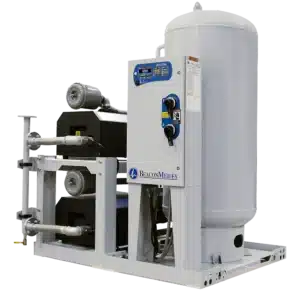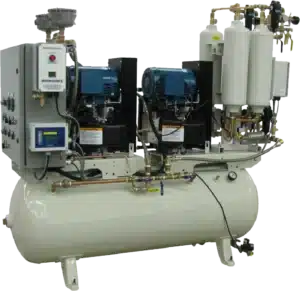An oxygen flowmeter is a medical device that measures the rate at which oxygen is being delivered to a patient from an oxygen source. The flowmeter is a critical component of oxygen delivery systems, ensuring that the appropriate amount of oxygen is being delivered to the patient at all times.
The basic design of an oxygen flowmeter consists of a calibrated tube, typically made of glass or plastic, with flow rate graduations marked along the length of the tube. Oxygen flows through the tube, and the flow rate is measured by the position of a float or ball within the tube. The flow rate graduations on the tube allow medical professionals to adjust the oxygen flow to the appropriate level for the patient’s needs.
Analog flowmeters use a float mechanism to measure the oxygen flow rate. The float is typically made of a lightweight material such as plastic or metal and is designed to rise or fall depending on the rate of oxygen flow. As the float moves, it indicates the flow rate on the calibrated tube. The float is often shaped like a small ball, which allows it to move easily through the tube without getting stuck.
Digital flowmeters use electronic sensors to measure the oxygen flow rate. The sensors are typically located in the body of the flowmeter and use various technologies such as ultrasonic or thermal flow sensing to measure the oxygen flow rate. The sensor readings are displayed on a digital readout, which allows medical professionals to adjust the oxygen flow rate more precisely than with an analog flowmeter.
Oxygen flowmeters are available in different flow rate ranges, from as low as 0-0.25 liters per minute (LPM) to as high as 25 LPM or more. The appropriate flow rate range depends on the patient’s needs and the oxygen delivery system being used. For example, a patient with chronic obstructive pulmonary disease (COPD) may require a flow rate of 1-3 LPM, while a patient undergoing surgery may require a flow rate of 8-10 LPM.
It is important to note that oxygen flowmeters should be used only by trained medical professionals. Incorrect use or calibration of a flowmeter can result in incorrect oxygen delivery, which can be harmful or even life-threatening to the patient. Regular maintenance and calibration of flowmeters are essential to ensure accurate readings and proper oxygen delivery.



